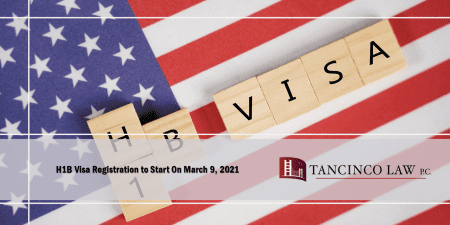Every year, U.S. petitioners seeking to hire professionals who are foreign nationals undergo a lottery system to obtain H1B visas for their prospective employees. Thousands of applicants, including those from the Philippines, who are on student visas and graduated from U.S. schools and those who are foreign educated, have opportunities to apply for professional working visas as long as they are eligible.
H1B is a professional working visa that will allow an individual to work in the United States for a specific U.S. employer and for a specific period of time. H1B visas allow workers to stay in the U.S. for up to three, or in some cases, six years and bring immediate family members with them. They also provide a pathway to receiving permanent immigrant visas or green cards.
The Lottery System
There are only 65,000 H1B visas each year plus 20,000 more reserved for individuals with master’s degrees or higher from U.S. institutions. With these limited numbers of visas, a lottery system has been put in place because there are more petitions submitted than the number of H1B visas available. Last year, there were 275,000 petitions filed which is way above the numerical limitations.
For many years, the system was for the U.S. Citizenship and Immigration Services (USCIS) to choose randomly from among the submissions. Once it reaches its 85,000 petitions it will stop accepting petitions. It will then notify petitioners whose petitions were accepted or rejected.
The selection process changed on December 6, 2019 when USCIS announced a new electronic registrations system. This new system requires petitioner’s to register electronically (instead of filing a paper petition) with the USCIS and pay a $10 registration fee before an H1B cap subject petition may be submitted. Registration period is announced by the USCIS before actual filing takes place. Last year, registration started March 1, 2020 through March 20, 2020 or until enough registrations are reached to receive the numerical limit. USCIS then sends notices to H1B visas to those who are accepted or rejected.
The past Trump administration attempted to change the selection process. USCIS would have prioritized H1B applications based on their wages with the workers offered the highest pay moving to the front of the line. On February 4, 2021, the USCIS announced that it will not implement this change because of technical challenges but instead will stick to the current lottery electronic registration system for the coming Fiscal Year 2022.
Registration period
USCIS announced that registration period begins on March 9, 2021 until March 25, 2021. Selected registrants by USCIS will be notified by March 31, 2021. USCIS will accept H1B petitions by April 1, 2021.
U.S. companies or businesses wishing to apply for the H1B visas for their employees need to plan early. They may contact their respective professional legal representatives to guide and assist them through the H1B process.


